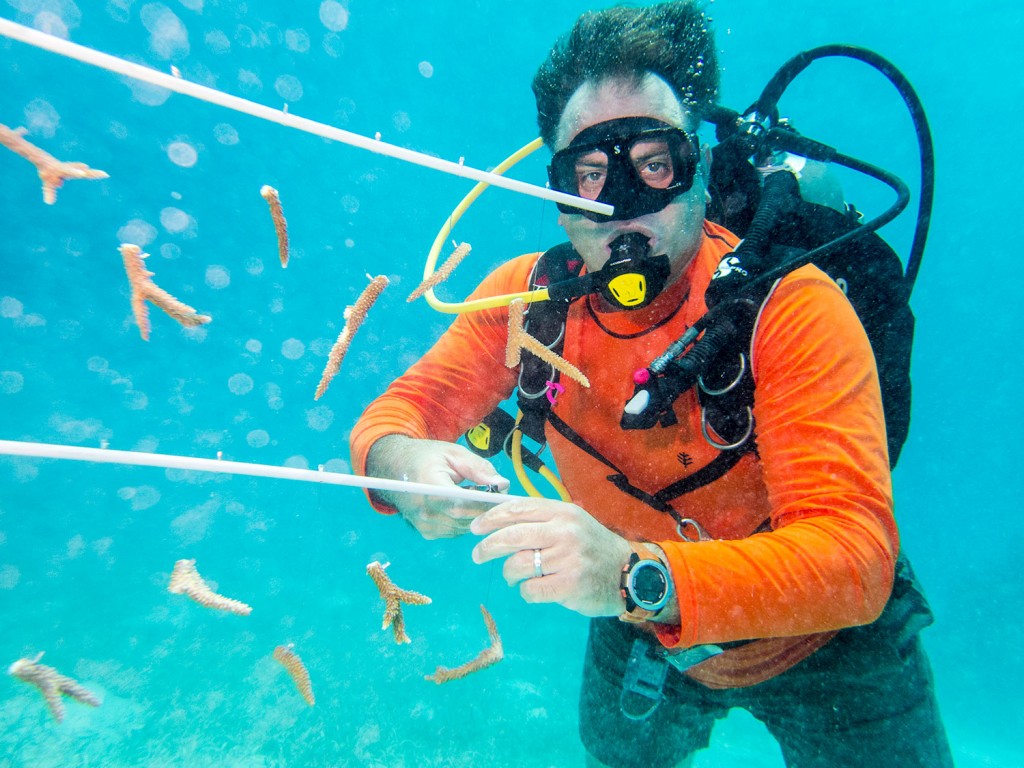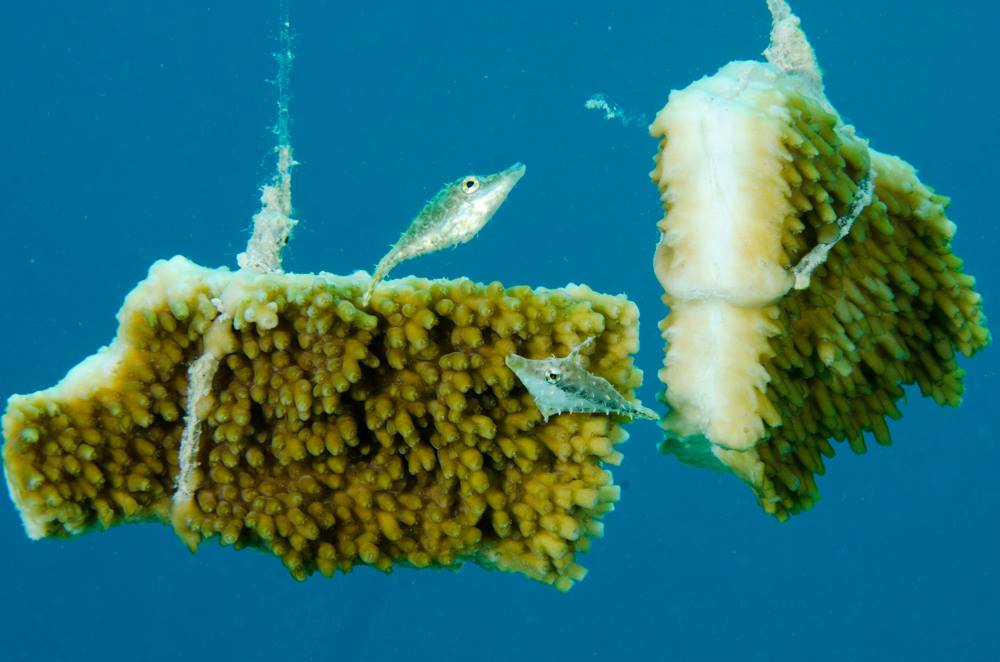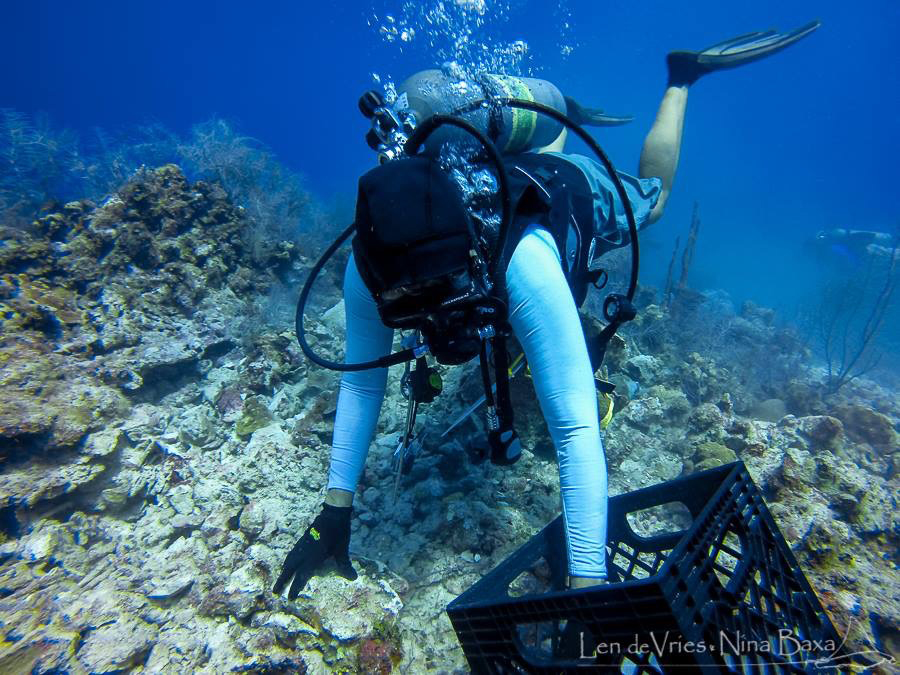Marine Life & Conservation
Ocean Frontiers: 20 Years of Conservation on Grand Cayman’s Pristine East End
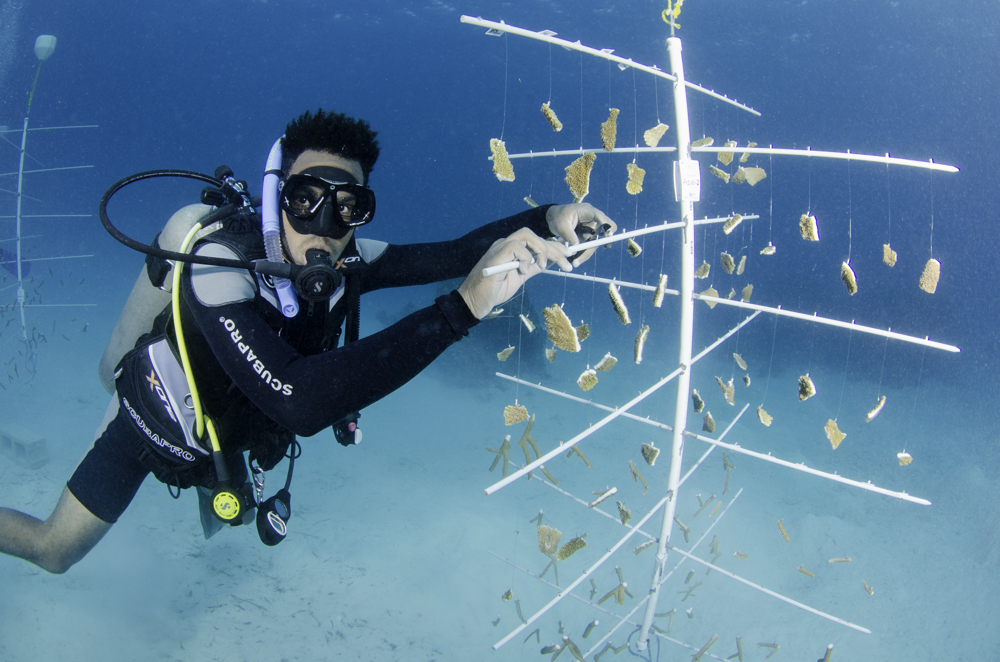
Ocean Frontiers has a proud history focused on ocean conservation, highlighted by the establishment of Grand Cayman’s first and largest coral nursery
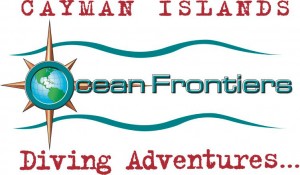 Ocean Frontiers, located at the Compass Point Dive Resort in Grand Cayman’s East End, is celebrating its 20th Anniversary as a dive operator this year. Co-owner Steve Broadbelt says there is no better way to mark the occasion than to announce the establishment of their long-anticipated coral nursery, a valuable tool for replenishing reefs at East End. Ocean Frontiers has a long history of conservation and environmental projects, and when the Cayman Islands Department of Environment called for proposals, Broadbelt submitted an ambitious plan. The timing was perfect because the coral trees were planted as the world celebrated Earth Day.
Ocean Frontiers, located at the Compass Point Dive Resort in Grand Cayman’s East End, is celebrating its 20th Anniversary as a dive operator this year. Co-owner Steve Broadbelt says there is no better way to mark the occasion than to announce the establishment of their long-anticipated coral nursery, a valuable tool for replenishing reefs at East End. Ocean Frontiers has a long history of conservation and environmental projects, and when the Cayman Islands Department of Environment called for proposals, Broadbelt submitted an ambitious plan. The timing was perfect because the coral trees were planted as the world celebrated Earth Day.
“We were thrilled to announce the installation of Grand Cayman’s biggest coral nursery during Earth Day celebrations because our project has been in the planning process for more than a year. To announce it at a time when we focus on the environment made the occasion even more memorable,” said Mr. Broadbelt. “The goal of our coral nursery is to grow coral fragments of the endangered Staghorn and Elkhorn corals and then out-plant the corals to designated reefs that have shown signs of coral loss or damage.”
With a coral restoration program in mind, Broadbelt brought Lois Hatcher on board a few years ago. With considerable experience and training in coral restoration, plus the passion to see it through, Hatcher was the perfect choice to manage it.
“I’m elated that it has finally happened!” says Ms. Hatcher. “The site is five minutes from the dock and I personally will go out whenever I can. I’m training most of the Ocean Frontiers staff on how to maintain the nursery. It is very much my baby, and I’m anxious about it working, like a mother hen fussing over her chicks.”
Broadbelt, Hatcher, and others, including two Caymanian students, spent the spring months doing prep work to set up its nursery. The work involved selecting strong donor coral colonies and monitoring them for potential problems – the goal is to install strong corals in the nursery to increase chances of survival. Materials needed to build the trees had to be collected, and structures assembled. Broadbelt himself installed all the anchors for the trees.
“The hope is that by out-planting the strong fingerlings grown in our coral nursery they’ll have a better chance of becoming established on the reef,” said Ms. Hatcher. “So far so good. We will be doing weekly maintenance on the site and reporting to the Department of Environment. The fragments will be monitored for disease, photographed and measured. They already show visible growth after only two weeks.
And the coral fragments are already attracting marine life. Ocean Frontiers is starting with 10 coral trees but expanding to 60 in time. Managing the largest coral nursery in Grand Cayman reflects Ocean Frontiers’ commitment to being a good steward of Cayman’s marine environment, from the first day it opened for business in February 1996. Broadbelt and co-owner Maurice “Mo” Fitzgerald always observe and promote ocean conservation, garnering recognition through the years.
Eco Milestones for Ocean Frontiers and Compass Point Resort
- Green Globe Certification for Compass Point in 2010
- Project AWARE’s Environmental Achievement Award in 2004 and 2010
- Governor’s Environmental Award for Tourism in 2014 for Compass Point
- PADI Green Star Dive Center Award for Ocean Frontiers
- Green Leader Recognition by TripAdvisor travel dive site
Current Ocean Frontiers Conservation Projects
- Invasive Lionfish Culling
- Coral Bleaching Monitoring & Temperature Data Collection Project
- Turtle Release Program Sponsor
- Teens4Oceans & Ocean Classrooms Sponsor
- Cayman Sea Sense – Shark Conservation and Tagging Project
- Green Shorts Challenge – program aimed at distributing diver load evenly at East End
- Coral Spawning – Ongoing documentation and data collection on annual event
“Before we began operating the great dive sites of East End were largely unavailable to divers staying in the Seven Mile Beach area, so we saw an opportunity to attract people by offering a free shuttle to our dive site. Demand skyrocketed and Ocean Frontiers launched into its successful first year.”
The founders focused on customer service and the industry’s leading edge. Ocean Frontiers was among the first Cayman operators to use nitrox. Because of a busy dive schedule, nitrox was introduced as a safety measure for dive staff. With time, Nitrox was accepted industry-wide, and customer demand went up. Ocean Frontiers became one of the few dive operations on Grand Cayman that offered Nitrox to customers. Customer satisfaction led to Ocean Frontiers being voted ‘World’s Best Dive Operator’ by the readers of Rodale’s Scuba Diving Magazine in their 1998 Readers’ Choice Awards.
“This was significant and it boosted our reputation and attracted more business to Ocean Frontiers,” said Steve Broadbelt.
Other milestones in the company’s growth:
- Grand Opening: A new state of the art dive facility with boat dock, retail shop, dive school and training pool, opened in 2000 not far from the original site where Ocean Frontiers began doing business in 1996. This introduced a new standard in luxury for divers and was a strong departure from dive shacks around East End that divers had been accustomed to.
- Shark Diving Program: In 2001 Ocean Frontiers introduced Cayman’s first and only Shark diving program with a classroom session on shark biology and conservation and a dive where divers experience as many as 8 to 16 Reef sharks up close. At the same time research was conducted with science partners such as the Guy Harvey Research Institute and Mote Marine Laboratory, but despite an immaculate safety record and a well-run program, the local government decided to ban shark diving in Cayman.
- Coral Spawning Dive: In 2002, Dr. Alex Mustard and Steve Broadbelt successfully observed and documented the annual coral spawning for the first time on record in the Cayman Islands. For the last 13 years Ocean Frontiers has been sharing this discovery and formula for calculating the spawning events every September and bringing this rare event in to the eyes of anyone that can dive and is not afraid of the dark.
- Public Moorings: Ocean Frontiers has helped the Cayman Islands Department of Environment increase public moorings from 10 to 40+ to open pristine dive sites in the East End.
- Eagle Rays Bar & Grill: Much anticipated by customers and staff, the dockside bar & grill opened for business in 2013 offering lunch, dinner and bar service. Eagle Rays features themed nights during the week, such as a ‘Divers Night’ every Tuesday with an island buffet and dive movies and photos of the week.
“Looking back over the last 20 years, there has been a common theme to our success – what is good for the environment is good for our business,” says Steve Broadbelt. “We started out as a very small dive shop with one boat, very few staff and big dreams. Even though we have grown little by little, we will always be a ‘first name basis’ place that retains a personal touch with outstanding service. 20 years later the picture is complete as a dedicated dive resort offering ‘roll out of bed and on to the dive boat’ convenience.”
To find out more about ocean Frontiers, visit www.oceanfrontiers.com.
Marine Life & Conservation
Leading UK-based shark conservation charity, the Shark Trust, is delighted to announce tour operator Diverse Travel as a Corporate Patron

 Corporate Patrons provide a valuable boost to the work of The Shark Trust. The Trust team works globally to safeguard the future of sharks, and their close cousins, the skates and rays, engaging with a global network of scientists, policymakers, conservation professionals, businesses and supporters to further shark conservation.
Corporate Patrons provide a valuable boost to the work of The Shark Trust. The Trust team works globally to safeguard the future of sharks, and their close cousins, the skates and rays, engaging with a global network of scientists, policymakers, conservation professionals, businesses and supporters to further shark conservation.
Specialist tour operator Diverse Travel has operated since 2014 and is committed to offering its guests high quality, sustainable scuba diving holidays worldwide. Working together with the Shark Trust will enable both organisations to widen engagement and encourage divers and snorkellers to actively get involved in shark conservation.
“Sharks are truly at the heart of every diver and at Diverse Travel, we absolutely share that passion. There is nothing like seeing a shark in the wild – it’s a moment that stays with you forever!” says Holly Bredin, Sales & Marketing Manager, Diverse Travel.
“We’re delighted to celebrate our 10th year of business by becoming a Corporate Patron of the Shark Trust. This is an exciting partnership for Diverse and our guests. We will be donating on behalf of every person who books a holiday with us to contribute towards their vital shark conservation initiatives around the world. We will also be working together with the Trust to inspire divers, snorkellers and other travellers to take an active role – at home and abroad – in citizen science projects and other activities.”
Paul Cox, CEO of The Shark Trust, said:
“It’s an exciting partnership and we’re thrilled to be working with Diverse Travel to enable more divers and travellers to get involved with sharks and shark conservation. Sharks face considerable conservation challenges but, through collaboration and collective action, we can secure a brighter future for sharks and their ocean home. This new partnership takes us one more valuable step towards that goal.”
For more information about the Shark Trust visit their website here.
For more about Diverse Travel click here.
Marine Life & Conservation
Shark Trust Asks Divers to help with Shark Sightings this Global Citizen Science Month

 Whether you are stuck for ideas of what to do with the kids or are off on the dive trip of your dreams. You can get involved in Citizen Science Month and help the Shark Trust by providing vital data about sharks are rays both close to home and further afield.
Whether you are stuck for ideas of what to do with the kids or are off on the dive trip of your dreams. You can get involved in Citizen Science Month and help the Shark Trust by providing vital data about sharks are rays both close to home and further afield.
In addition to reporting the sharks and rays you see on your dives, the eggcases you find on the beach, the Shark Trust is looking for some specific data from divers who are asked to report any Oceanic Whitetip and Basking Sharks.
Oceanic Whitetip Sharks
The Shark Trust are looking specifically for Oceanic Whitetip Shark sightings over the coming weeks and months. So, if you are diving anywhere in the world, please report your sightings via the website or app.
Website: https://recording.sharktrust.org/
App: Search The Shark Trust in your app store
The Oceanic Whitetip. Known for their incredibly long dorsal and pectoral fins, this species was once the most abundant oceanic-pelagic species of shark on the planet.
Large and stocky, they are grey or brown above, and white below and famous for their huge rounded first dorsal fin and paddle-like pectoral fins. The fins also highly prized within the shark fin trade. Whilst they are mostly solitary, Oceanic Whitetips do occasionally hunt in groups.
An inquisitive species, they were easy prey for fisheries. Combined with their low reproductive rate, they were inevitably at high risk of population depletion. And declines of up to 99% have been reported in certain sea areas. They are listed as Critically Endangered on the IUCN Redlist (2019).
Conservation efforts to discourage further declines include listing on CITES Appendix II and CMS Appendix I. They’re also the only species prohibited from take by all the Tuna RFMOs (Regional Fisheries Management Organisations). However, these measures do not mean that Oceanic Whitetips are not still caught – whether targeted or as bycatch – in some parts of the world. With populations declining at such a high rate, effective implementation of management measures is essential to ensure that the species can recover.
If you are lucky enough to get an image of an Oceanic Whitetip and you record your sighting on the Shark Trust app or website YOU CAN WIN! All images submitted with sightings, that also give consent to use in conservation messaging, will be in with a chance to win an Oceanic Whitetip T-shirt and mug. The competition will run until the end of “Shark Month” in July – so keep those sightings (and images) coming in.
Basking Sharks
Basking Shark (Cetorhinus maximus) season is upon us, and the Shark Trust is asking everyone to keep an eye out for these majestic giants over the summer months. If you see any, you can record your sighting to the Basking Shark Sightings database.
Each year, these mighty fish return to British waters to feed on plankton. You may see one, (or a few if you’re really lucky) from around April-October. They can be seen feeding at the surface of the water, where they look like they’re basking in the sun. Thus, their name!
Sighting hotspots around the British Isles include southwest England, Isle of Man, north coast of Ireland, and western Scotland. The Sea of the Hebrides is the most prolific sightings area in Scotland, but they have been spotted all around the coast and have even ventured into some of the sea lochs. The Shark Trust has received thousands of sightings since the Basking Shark project began, but more data is needed to truly understand what is going on with population numbers and distribution. You can help by recording your sightings this summer.
Great Eggcase Hunt
The Shark Trust has an Easter Egg Hunt with a difference for you to try. Take part in the Great Eggcase Hunt and get involved with a big citizen science project that helps shark, ray and skate conservation. And it’s an enjoyable activity for all the family.
The Shark Trust also want snorkellers and divers to record their underwater eggcase findings. Underwater records help pinpoint exactly where sharks and skates are laying their eggs and can help link to beach records. Learning the depth and substrate that they lay on also helps better understand the species.
Find out more: https://www.sharktrust.org/great-eggcase-hunt
Whether you are diving, snorkelling or exploring on the beach you can take part in Citizen Science Month and get actively involved in shark and ray conservation. Find out more: www.sharktrust.org
-

 News3 months ago
News3 months agoHone your underwater photography skills with Alphamarine Photography at Red Sea Diving Safari in March
-

 News2 months ago
News2 months agoCapturing Critters in Lembeh Underwater Photography Workshop 2024: Event Roundup
-

 Marine Life & Conservation Blogs2 months ago
Marine Life & Conservation Blogs2 months agoCreature Feature: Swell Sharks
-

 Blogs1 month ago
Blogs1 month agoMurex Resorts: Passport to Paradise!
-

 Gear News3 months ago
Gear News3 months agoBare X-Mission Drysuit: Ideal for Both Technical and Recreational Divers
-

 Blogs2 months ago
Blogs2 months agoDiver Discovering Whale Skeletons Beneath Ice Judged World’s Best Underwater Photograph
-

 Gear Reviews2 months ago
Gear Reviews2 months agoGear Review: Oceanic+ Dive Housing for iPhone
-
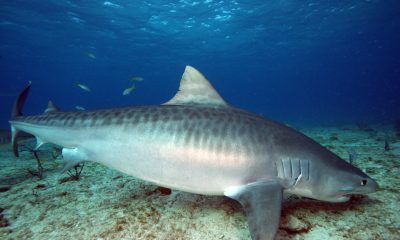
 Blogs3 months ago
Blogs3 months agoThe Thrilling Encounter with Tiger Sharks at Beqa Lagoon’s ‘The Colosseum’ with Coral Coast Divers


